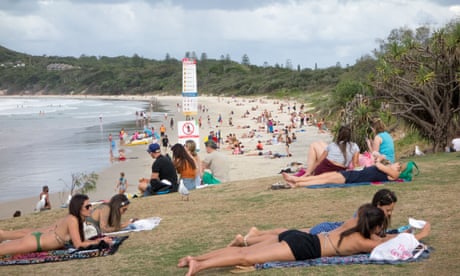- by foxnews
- 23 May 2025
NSW’s most popular holiday spots divided over limits on Airbnb rentals
NSW’s most popular holiday spots divided over limits on Airbnb rentals
- by theguardian
- 22 Apr 2023
- in news

Councils responsible for some of New South Wales' most popular tourism destinations are urging the incoming Minns government to give them the power to further restrict short-term holiday rentals.
In December, the Byron shire council, which has the highest rate of homelessness in the state outside Sydney, voted in favour of introducing a 90-day cap on some short-term holiday rentals in an effort to generate more long-term rental supply.
This would have been the strictest cap in the state after the previous government allowed councils to opt in to a 180-day cap.
But Byron's council was blindsided by a last-minute intervention by the Perrottet government to revoke an earlier decision to give council the power to decide.
Instead, it referred the matter to the NSW Independent Planning Commission, which in February held public hearings into the proposal.
"They need to give local councils the tools to manage competing interests," says Michael Lyon, mayor of Byron shire council.
"We know best how to limit it so we are not overwhelmed and it doesn't create onward impacts to other businesses by having a lack of housing for workers."
The Minns government has not yet articulated a position on how it plans to tackle the pressure short-term holiday accommodation has placed on the long-term rental market.
A spokesperson for the minister for planning, Paul Scully, said the government is awaiting the commission's findings before deciding whether the Byron Shire council can impose a 90-day cap.
As a result of an expanding short-term rental accommodation market and critically low long-term rental vacancy rates, a number of other councils - including Randwick, Eurobodalla, and the Snowy Monaro - told Guardian Australia they should have the autonomy to set whatever caps they choose.
Narelle Davis, mayor of the Snowy Monaro regional council - which doesn't yet have a cap on short-term holiday accommodation - said it has been watching "very closely" Byron Bay's proposal to impose a 90-day cap.
"We'd like to have far more flexibility within that regulation to allow council to make better decisions for our community," she said. "Especially for our lower income community who are really suffering from the housing shortage."
Mathew Hartcher, mayor of the Eurobodalla shire on the state's south coast, agrees. After the black summer bushfires, the council and neighbouring Bega Valley shire put a call-out to ratepayers urging them to consider placing any short-term holiday lets on the long-term rental market.
"We are at the coalface of this and we know what's right for each of our communities and that can be different across different councils," he said.
President of Local Government NSW, Darriea Turley, said it had become clear that the current 180-day cap does not work for all councils.
"There is no silver bullet, no cookie-cutter solution, no one-size-fits-all when it comes to short-term holiday rentals," Turley said.
Not everyone is in favour of imposing caps on short-term rentals. During the public hearings in Byron, one local business owner said it would cause him to lose 65% of his business overnight.
A representative for Airbnb who appeared at the hearings, Steven Berveling, argued a cap wouldn't lead to increased long-term rentals, and would negatively impact employment in the tourism sector.
But some argue the government should regulate even further.
Tamara Smith, the Greens MP for Ballina - which takes in most of the Byron Bay shire - said the party will be advocating for short-term holiday accommodation to be prohibited where rental vacancy rates are lower than 3%.
Lyon said he didn't believe this would be practical. But he advocated for the government to follow a proposal by Western Australian government requiring councils to approve properties being turned into short-term holiday rentals.
He also argues the fee to register properties as a short-term holiday rental - currently $65 - should be increased and that money should be put back into the council.
"These holiday-let properties make an absolute fortune, especially at top end of market," he said. "If we charged $1000-$2000 a year that would put some serious coin into actually being able to enforce the regulated policy."
- by foxnews
- descember 09, 2016
United Airlines flight returns to Hawaii after concerning message found on bathroom mirror; FBI investigating
United Airlines Flight 1169 to Los Angeles returned to Hawaii after a "potential security concern" aboard the plane. The FBI and police are investigating.
read more


